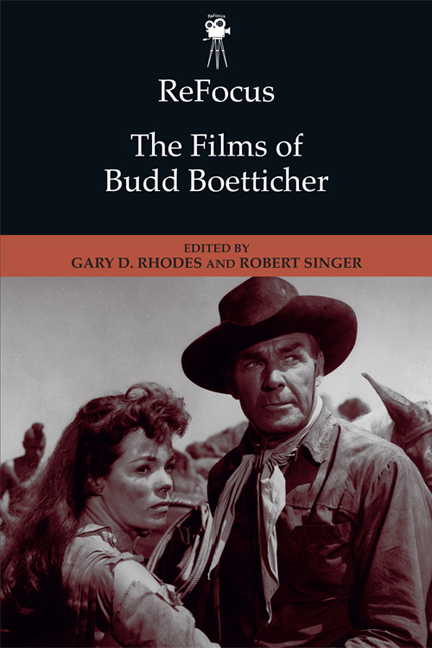Book contents
- Frontmatter
- Contents
- Notes on Contributors
- Dedication
- Introduction
- Part 1 The Non-Westerns
- Part 2 The Westerns
- Part 2 Introduction
- 7 The Ranown Cycle: Budd Boetticher's “New Look” Western Programmers in 1950s Hollywood
- 8 Framings, Motifs, and Floating Poker Games in Seven Men from Now (1956)
- 9 The Ranown Style: Mapping Textual Echoes
- 10 You Were Married, But You Never Had a Wife: The Use of Space in the Westerns of Budd Boetticher
- 11 Ideology and Boetticher's Westerns from the Late 1950s
- 12 Outlaws Without a Cause: Generational Conflict in Budd Boetticher's Ranown Cycle
- 13 The Box in the Desert: Budd Boetticher, Breaking Bad, and the Twenty-first-century Western
- Index
Part 2 - Introduction
from Part 2 - The Westerns
Published online by Cambridge University Press: 22 December 2017
- Frontmatter
- Contents
- Notes on Contributors
- Dedication
- Introduction
- Part 1 The Non-Westerns
- Part 2 The Westerns
- Part 2 Introduction
- 7 The Ranown Cycle: Budd Boetticher's “New Look” Western Programmers in 1950s Hollywood
- 8 Framings, Motifs, and Floating Poker Games in Seven Men from Now (1956)
- 9 The Ranown Style: Mapping Textual Echoes
- 10 You Were Married, But You Never Had a Wife: The Use of Space in the Westerns of Budd Boetticher
- 11 Ideology and Boetticher's Westerns from the Late 1950s
- 12 Outlaws Without a Cause: Generational Conflict in Budd Boetticher's Ranown Cycle
- 13 The Box in the Desert: Budd Boetticher, Breaking Bad, and the Twenty-first-century Western
- Index
Summary
Budd Boetticher's reputation as an auteur exists due to his memorable work in the Western genre; although his non-Western productions deserve critical reappraisal and will receive renewed attention in this volume, this chapter exclusively celebrates the Boetticher Western.
His connection to the Western film genre has deep personal and production roots, dating to Black Midnight (1949), starring Roddy McDowall, and The Wolf Hunters (1949), starring Kirby Grant, both produced during the period in which he was still credited as “Oscar Boetticher.” Under the name “Budd Boetticher,” he proceeded to direct a trio of Westerns in 1952: The Cimarron Kid, starring Audie Murphy; Bronco Buster, starring John Lund; and Horizons West, starring Robert Ryan. Boeticher subsequently directed Seminole (1953), starring Rock Hudson, The Man from Alamo (1953), and Wings of the Hawk (1953), starring Van Heflin, as well as later directing three episodes of the television program Maverick in 1957, five episodes of Zane Grey Theatre in 1960–1, and one episode of The Rifleman in 1961. He continued to work in the genre until 1969, when he directed A Time for Dying, starring Richard Lapp. It proved to be Boetticher's final Western feature.
However, as the Introduction notes, Boetticher's most notable achievement directing in the Western genre was the “Ranown Cycle,” a series of seven films featuring the Western male icon, Randolph Scott: Seven Men from Now (1956), Decision at Sundown (1957), The Tall T (1957), Buchanan Rides Alone (1958), Ride Lonesome (1959), Westbound (1959), and Comanche Station (1960).
Part 2 examines the Ranown Cycle at length, from multiple critical perspectives, exploring the films for which Boetticher is best known.
- Type
- Chapter
- Information
- ReFocus: The Films of Budd Boetticher , pp. 119 - 120Publisher: Edinburgh University PressPrint publication year: 2017

